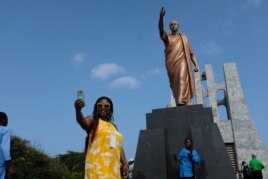26 August, 2019
A large sign on the way to the Ghanaian city of Assin Manso shows an image of two African slaves. Each person is wearing a single piece of cloth. Their arms and legs are secured in chains. Next to them are the words, "Never Again!"
The sign marks what is known as "slave river." Centuries ago, captured Ghanaians washed up here before being shipped across the Atlantic Ocean into slavery. They would never return to the land of their birth.
It has been 400 years since the first Africans arrived in what was then the English colony of Virginia. The anniversary has led to increased demand for ancestral tourism to Ghana and West Africa. People in the United States, the Caribbean and Europe seek to connect with their roots.
"Ten years ago, no one went to the slave river, but this year has been massive," said Awuracy Butler. She heads a company called Butler Tours.

A member of a heritage tour group, traveling to Ghana to explore their ancestral roots, takes a selfie under the statue of Ghana's first president Kwame Nkrumah in Accra, August 7, 2019. Picture taken August 7, 2019. REUTERS/Francis Kokoroko
"Everyone wants to add the slave river to their tour," she said. The buildings where those captured spent their last days in Ghana are also increasingly popular, Butler said.
Anthony Bouadi is a tour guide at Cape Coast Castle, a fortress where the captives were kept until they were sent on ships over the Atlantic. He believes the old buildings can change the lives of those who visit.
"The moment you get to know your history, it is going to change you," he said. "We are encouraging our brothers and sisters from the U.S., from the Caribbean and from Europe to come back to their Motherland Africa to get to know the culture ... and whatever the ancestors went through."
Unlike other West African countries, Ghana has aggressively marketed its "heritage" offerings for the 400th anniversary. Officials see it as a chance to bring some much-needed foreign investment into Ghana. The country's economy has struggled in recent years with high inflation and public debt. Many of the country's 28 million people live in poverty.
The Ghana Tourism Authority expects 500,000 visitors this year, up from 350,000 in 2018. Of those, 45,000 are estimated to be seeking their ancestral roots.
The rise is part of a larger, international movement. The home-sharing company Airbnb reports that the number of people visiting areas linked to their ancestry is five times higher than it was five years ago.
Questions remain about whether the increased interest in Ghana will continue after the anniversary. Bad roads, a complex visa process and costly flights could keep the number of visitors down in the long term.
"The government has a huge responsibility," notes Peter Appiah. He is head of research and publicity at the Centre for National Culture in Kumasi, Ghana's second-largest city.
He said that if Ghana hopes to keep the tourists coming, "we need to do a lot more in terms of social infrastructure."
A big year
At Assin Manso, a group of tourists take off their shoes and walk down a path to the "slave river." They first put their hands in, and then slowly walk into the water.
"I can't even get my head around people coming from a land like this and being snatched," said one of the visitors, Miriam Allen. She is a 62-year-old retired city planner from New York.
"This is a good place and a bad place, Allen said. "A good place to know your ancestors, but to know what those white people did to us. I can't ..." she said. Her voice breaks as she tries not to cry.
On most tours, Assin Manso marks one of the final stops on a country-wide trip. The visitors take part in Ashanti traditions and meet local chiefs. They go along the same path that captured slaves took from the country's north out to coast.
The forts that still stand along Ghana's coast are evidence of what slaves went through during their final days on the continent.
At the Cape Coast Castle, old cannons point out to sea. Here slaves were held in hot, dark underground prisons. Today, huge numbers of visitors are returning to these dungeons.
"I have seen a lot of people - they really are coming," said Bouadi, the guide at the castle. He now does up to six tours a day compared with three a day last year.
"Tourism organizations in Ghana are having to hire more people," Bouadi said. "If people earn more, they can pay for school fees; it boosts the local economy and reduces poverty."
I'm Ashley Thompson.
And I'm Caty Weaver.
The Reuters news agency reported this story. Ashley Thompson adapted it for VOA Learning English. George Grow was the editor.
______________________________________________________________
Words in This Story
chain - n. a series of usually metal links or rings that are connected to each other in a line and used for supporting heavy things, for holding things together, for decoration, etc.
tourism - n. the activity of traveling to a place for pleasure
moment - n. a particular time : a precise point in time
encourage - v. to make (someone) more determined, hopeful, or confident
heritage - n. the traditions, achievements, beliefs, etc., that are part of the history of a group or nation
infrastructure - n. the basic equipment and structures (such as roads and bridges) that are needed for a country, region, or organization to function properly
snatch - v. to take (something or someone) suddenly from a person or place often by using force
cannon - n. a large gun that shoots heavy metal or stone balls and that was once a common military weapon
hire - v. to give work or a job to (someone) in exchange for wages or a salary
boost - v. to increase the force, power, or amount of (something)